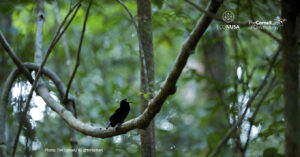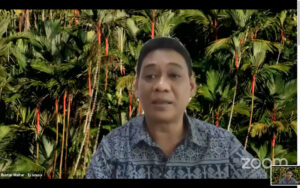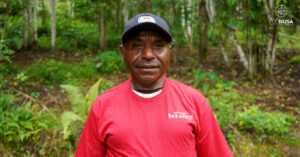
The land of Papua and the Maluku Islands is the last hope with the largest cluster of tropical rainforests in Indonesia after forests in Sumatra, Kalimantan and Sulawesi continue disappearing with massive conversion into industrial areas, settlements, public facilities and infrastructure. Both the Land of Papua and Maluku Islands are home to hundreds of thousands of plant and animal species. Based on the Papuan Ecology book, Tanah Papua is the home to 2,560 species of fish, 552 species of birds, 191 mammals, 150,000 insects and 15,000-20,000 species of plants. One of them is cenderawasih, a bird of paradise that has been widely known to the world for centuries.
Cenderawasih is also known as the bird of paradise because of its beautiful feathers and exotic movements. Some cultures of indigenous peoples in the Land of Papua and the Maluku Islands also refer to them as birds of the sun or birds of gods because of their beauty and magnificence.
Scientifically, cenderawasih is classified into the Paradisaeidae family. Based on birdsoftheworld.org Cornell Lab of Ornithology, there are 42 species of birds of paradise around the world. Around 29 species live in Indonesia, namely in the Land of Papua and the Maluku Islands. These birds of paradise live scattered from the Waigeo – Raja Ampat region, the Arfak Mountains, Mamberamo, the Foja Mountains, the wilderness on the Tambraw coast, Jayapura, Nimbokrang, Yapen, Lorentz National Park, Wasur – Merauke, to near the Papua New Guinea border. They also exist in Aru Islands, Halmahera Island and Obi Island in North Maluku. Nine species of these birds are endemic as they can only be found in Papua Land and the Maluku Islands. Seven endemic species only live in certain areas in the Land of Papua. Meanwhile, dan the other two endemic species of paradise are found in Halmahera Island and Obi Island in North Maluku.
The dense canopy of tropical rainforest with tall trees on the island of Papua and the Maluku Islands are the places for the birds of paradise to live. They inhabit the forests of the highlands to the lowlands. Some of them are fruit eaters. Some are insectivorous. The forest is deemed the place in which the birds of paradise depend on their lives and reproduction.
Cenderawasih or birds of paradise is not only part of the chains of life in the dense and quiet wilderness of the tropical rainforests of Papua and Maluku, but also a symbol of tradition, philosophy of life and cultural identity that cannot be separated from the indigenous peoples life. Long before the world called it birds of paradise, indigenous people interpreted these birds of paradise as a symbol of custom that must be preserved as a form of human respect for nature that gives life.
Unfortunately, cenderawasih are increasingly facing a real threat. These paradise birds continue to lose their homes, tropical rainforests in paradise lands. Deforestation, expansion of large-scale plantations, mining and land clearing threaten cenderawasih and all natural ecosystems that are the main support for the livelihoods of indigenous peoples and the support of the world’s climate. According to data from the Ministry of Environment and Forestry, in the 2018-2019 period, Papua Land has lost 11,212.2 hectares of forests in Papua Province and 5,296.1 hectares in West Papua Province. Meanwhile, in the Maluku Islands, forest cover loss was 1,271.8 hectares in Maluku and 3,326.8 hectares in North Maluku.
Based on the analysis of the EcoNusa Research Team, the Mining Business Permit (Izin Usaha Pertambangan/IUP) in Papua Land and the Maluku Islands occupies a total area of 11.39 million hectares. Around 86% of the total area with the IUP is located in the primary natural forest. If the forest in all mining areas is cleared, it is likely that 10% of primary natural forest in Indonesia, equivalent to 149 times the area of the capital city DKI Jakarta, will be gone.
The loss of forests in the Land of Papua and the Maluku Islands has threatened the existence of cenderawasih as protected animals and the cultural identity of the indigenous community. The condition also threatens the sustainability of the entire life chain in the ecosystem as well as the lives of indigenous peoples and cultural heritage from generation to generation.
For this reason, EcoNusa engages a close collaboration with Cornell Lab of Ornithology (CLO) to campaign for the preservation of tropical rainforests in Papua Land and the Maluku Islands as the habitat for birds of paradise through a so-called Defending Paradise campaign.
“Defending Paradise is a campaign that we will launch to maintain the harmony of nature in Papua and Maluku. We call it paradise, because Papua and Maluku are like a piece of heaven that fell off the earth, so we must protect it. Paradise is the forest and sea in Papua and Maluku that give us life, especially to the indigenous people of Papua and Maluku. It also serves as the biggest climate stabilizer currently in Indonesia and also the world, so it is an asset we should protect to sustain our lives in the long run. EcoNusa closely collaborates with CLO which has conducted a lot of research on cenderawasih. And cenderawasih is also called the birds of paradise which will become an icon in this campaign, ” said Bustar Maitar, CEO of EcoNusa, during the Outlook EcoNusa event, February 17, 2021 in Sorong, West Papua.
The Defending Paradise campaign starts March 21, 2021 in commemoration of the International Forest Day which will continue until September 2021 through social media and digital platforms. This campaign aims to spread awareness, especially for the younger generation of Indonesia, about the importance of preserving tropical rainforests and birds of paradise, as one of the biodiversities in the Land of Papua and the Maluku Islands that need protecting. The existence of Cenderawasih signifies that the forests in the eastern region of Indonesia archipelago are still standing straight to support life and provide contribution to the world’s climate balance.
Editor: Leo Wahyudi




